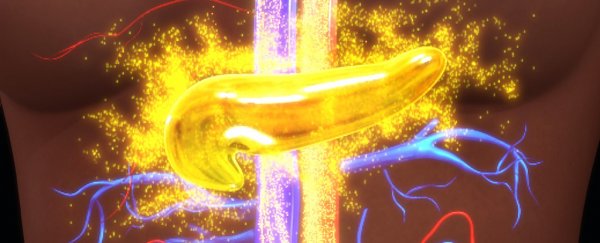Researchers have been able to reverse symptoms of diabetes and restore pancreas functions in mice by putting them on a version of the fasting-mimicking diet.
The diet tricks the body into a fasting mode for a few days a month, even while carefully selected foods are still being eaten, and it could be enough to reboot the organ's key functions and restore insulin production, scientists say.
Diabetes occurs when the pancreas cannot make insulin (type I) or is damaged by insulin resistance (type II), and the team from the University of Southern California says the diet reversed symptoms of both types of diabetes in mice.
"By pushing the mice into an extreme state and then bringing them back… the cells in the pancreas are triggered to use some kind of developmental reprogramming," says the head of the research team, Valter Longo.
In humans, the fasting-mimicking diet has been credited with helping people lose weight more effectively, and previous studies have also linked it to reducing risk factors for diseases like heart disease and cancer.
The diet has also been credited with reducing the symptoms of Multiple Sclerosis, so it's earning quite a reputation amongst scientists. In each case starving the body seems to reset the production of healthy cells.
In the latest study, mice were put into the artificial fasting mode for four days a week over a period of several months.
Scientists found this was enough to regenerate beta cells in the pancreas, responsible for storing and releasing insulin. Damaged cells were replaced by working ones.
The team also experimented on pancreatic cell cultures from human donors with type I diabetes. Here too, simulated fasting produced more insulin and more of the Ngn3 protein required for normal pancreatic function.
In other words, the signs are good that this could work in humans too.
However, we shouldn't get ahead of ourselves just yet – the study so far only covers tests on mice, as well as human cells in lab conditions, and the researchers warn against trying this at home to treat diabetes.
What's more, the diet requires carefully measured levels of calories and types of foods to be effective, so medical evidence will still be required as well.
In the future, though, it may be possible to adapt the fasting-mimicking diet to help treat diabetes and restore pancreatic function, all without relying on medication.
"Scientifically, the findings are perhaps even more important because we've shown that you can use diet to reprogram cells without having to make any genetic alterations," says Longo.
The next step is to set up a clinical trial in humans, and preparations for that are already underway.
"The amazing thing is that this system has probably always been there," says Longo. "Now that we've discovered it, we can find ways to work with it and utilise it for benefits to human health."
The findings have been published in Cell.
